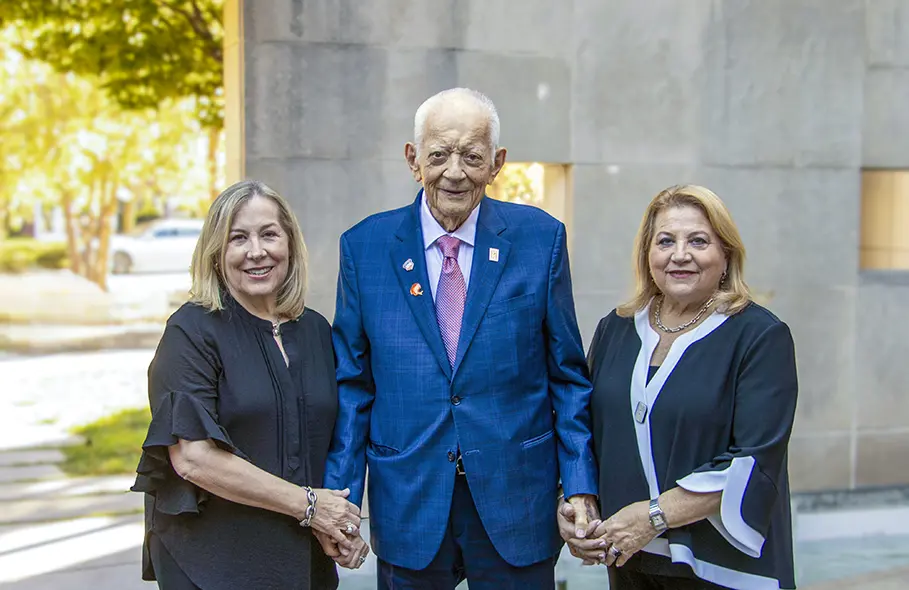Unlocking Hope: Goldstick Initiative Amplifies Voices in Special Education
by Tom Hanlon / Sep 17, 2025

Phillip C. Goldstick accomplished a lot in his 93 years on this earth.
He was a member of the Fighting Illini Football Team, 1952 Rose Bowl champions.
A business graduate of the University of Illinois, he later served as a member of the board of directors of the University of Illinois Foundation and as a member of the Illinois House of Representatives.
He was a partner in Phillip C. Goldstick & Associates, a successful real estate law firm in Chicago.
But in the College of Education, Phil, who passed away in February 2025, will perhaps be most remembered for the Goldstick Initiative.
He and his wife and fellow Illinois alum, Beverly Kramer Goldstick, established the initiative in 2005 through an endowment to the College.
The initiative is an ongoing, three-pronged effort that offers an annual lecture, scholarships, and fellowships to support research that enables children with communication disorders to live as independently as possible in their homes, neighborhoods, and communities.
The 21st Annual Goldstick Family Lecture takes place on Thursday, September 25, at 4:00 p.m. at the U of I Foundation Philanthropy Center, 303 St. Mary’s Road, Champaign. This year’s Goldstick lecturer, Zach Rossetti, an associate professor of special education at Boston University, will be talking on “Prioritizing Friendship in School and Community.”
All in the community are invited to attend.
Funding Research, Preparing Educators
Phil and Bev Goldstick had a particular interest in funding research, education, and training because their granddaughter, Marissa Zelinger, has Rett syndrome, a genetic disorder that occurs primarily in girls and impairs motor abilities, including language and fine and gross motor abilities. There is no known cure for Rett syndrome.
“My dad always wanted to give back to the university,” says Caryn Zelinger, one of two daughters of Phil and Bev. Indeed, the Goldstick family has supported a range of programming, including student scholarships, fine arts, athletics, and research at the U. of I.
When their granddaughter was diagnosed with Rett syndrome, it was a no-brainer for Phil and Bev to begin the lecture series and later expand it to fund research and scholarships.
“My parents created a wonderful marriage between what they wanted to accomplish and the university and College of Education,” Caryn says. “They wanted to emphasize best practice and education so that students can go out in the world and be great educators in special needs and in communication.”
“Caryn and I are committed to supporting and facilitating the legacy that our parents started,” says Caryn’s sister, Gale Goldstick Cohen. “The venue that we have through the university is a robust one, with people who are as committed to this as we are. We plan to continue what our parents began.”
Stride Autism Centers
It’s a full-on family affair, as Phil and Bev’s grandson, Brad Zelinger (Caryn’s son), is founder and CEO of Stride Autism Centers, which offers individualized ABA (applied behavior analysis) therapy to preschoolers aged 2-6. Stride provides one-on-one therapy and group activities aimed at improving communication skills, social skills, and other areas critical for school readiness.
Brad opened the first Stride Autism Center in October 2020. Now, 22 centers are in operation in Illinois, Iowa, Nebraska, and South Dakota.
Brad was in the midst of carving out a highly successful career in finance when he pivoted to launch Stride.
“I wanted to do work that was more rewarding and gave me the ability to make a difference,” he says. “I wanted to help make transformational impacts in the lives of people with autism and related disorders.”
To that end, Brad encourages all Stride Autism Centers clinical staff to livestream the annual Goldstick Lecture. “Professional development and continuous improvement are core values at Stride,” he says. “We’re all trying to learn more and grow each day, so any opportunity that we have that can help us grow our skillsets is exciting.”
Brad, who is Marissa’s brother, says his family’s experience and the Goldstick Initiative also motivated him to open Stride Autism Centers.
Marissa, 38 years old, has very limited communication abilities. But she has found art as one important way to communicate and express herself.
“We look for her abilities more than her disabilities in all aspects of her life,” says Caryn, her mother. “She’s very artistic. Art is a big part of her life.”

“It’s easy to point to Marissa not having a voice in being able to communicate her needs,” Brad adds. “But on the flip side, what hasn't been taken away from her is her very infectious smile and attitude. She really brings a lot of light into our lives and the lives of people who come into contact with her. It’s a huge inspiration for our family in all that the initiative is doing for the voices of people like her.”
Brad notes that the family has long been involved in supporting autism and related issues. For example, Brad serves on the board for the Rett Syndrome Research Trust and, in 2015, founded Reverse Rett Chicago, a fundraiser that has generated more than $3 million for Rett syndrome research since its inception.
A Legacy of Giving Back—and Funding Future Solutions
“My parents were staunch supporters throughout their lives of the U. of I.,” says Caryn, whose mother passed away in 2018. “The impact they’ve had on people through the university, it was an important part of their lives.”
“They believed in developing the next generation of thought leaders in this field of communication disorders,” Brad notes. “That’s what this initiative is all about.”
The Goldstick Initiative has impacted countless numbers of scholars, educators, and students through a steady flow of funding that has supported research. For example:
- The Goldstick Doctoral Fellowship extends a $10,000 grant to Special Education doctoral students to support them in completing their research. Since the fellowship began, over $500,000 has been awarded.
- The Marissa Zelinger Research Awards recognize outstanding research by faculty-student research teams. Teams that display exemplary research in communication disorders are eligible for a $4,000 award toward their work. To date, nearly $40,000 has been awarded to research teams at the University of Illinois as part of this initiative.
The initiative includes a Goldstick Family Scholar, who is charged with providing leadership to the annual Goldstick Family Lecture Series on Communication Disorders. The scholar identifies and invites a leading scholar in the field to address the public and meet with faculty and students about their lines of related research.
Michele Schutz, assistant professor in the Department of Special Education, is the fifth faculty member to be named Goldstick Family Scholar. Past Goldstick scholars include Cheryl Light Shriner, Hedda Meadan, Micki Ostrosky, and Jim Halle.
“Our family has really developed a strong relationship with the College of Education,” Caryn Zelinger says. “It makes a big difference to these students to get these scholarships and fellowships. There’s a strong dynamic between us and the College, and my sister and I are committed to continuing that legacy.”